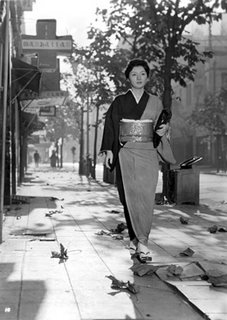Her Lonely Lane

I've just fallen in love with the films of Mikio Naruse, a Japanese director who made most of his films in the fifties and was beloved by Kurosawa (Kurosawa at one time was Naruse's assistant). Courtesy of BAM. I guess you could say the films are Japanese kitchen sink dramas. Okay, I've just seen one film--Repast, about a housewife deciding whether to leave her distracted, inattentive salaryman--but it was so wonderful that I feel it's safe for me to say I will be just as moved and delighted by the next ones I see. And I plan to see as many as possible. The last time this happened it was 2001, I was sort of heartbroken, and I hightailed it over to the Film Forum and ate as many Eric Rohmer films as I could. The only male act of art consumption I've ever engaged in--as in, the last time I was in manic bordering on pathological completist mode, and I was relieved and surprised to discover I had it in me. The point here being that the films are as gentle and surreptitiously (and not so surreptitiously) devastating as Rohmer films, and apparently the New Wavers were fans.
Here's someone (i.e. Kurosawa) saying it better than I can, because the coffee hasn't kicked in yet. From Berkeley, earlier this year, when the university hosted a festival:
“Happiness is a concept that was invented in the modern world,” remarks a character in Mikio Naruse's 1952 film Lightning; the irony is that, more than any of the great Japanese directors whose equal he was—Mizoguchi, Ozu, and Kurosawa—Naruse's world is the modern world. It's just not very happy.
Kurosawa once characterized Naruse's style as being “like a great river with a calm surface and a raging current in its depths.” Naruse's melodramas are character studies revealed in gestures, plots unfolding in a glance. Raised in poverty, he was drawn to those who live on the edge of society's comforts—whether emotional or economic—and so it is not surprising that his abiding subject is women, from the stultifying oppression of marriage to the tarnished rituals of the anachronistic geisha. The novelist Fumiko Hayashi was his favorite source for plots epitomizing his own vision that modern women are offered only illusory freedom. Audie Bock, who championed this relatively unheralded director years ago in her book Japanese Film Directors and in a monograph, writes of the “condition of trapped awareness” in Naruse's women.
If you like stately, unmelodramatic melodrama*, and telling shots of weathered shoes set out before doors and cats on rooftops coupled with shots of people just sitting around eating or drinking or reading the newspaper as if they were acts of prayer, and would like to see a film that feels you leaving like you read a novel, here's the schedule.
*Can we all work together on coming up with a word to replace the pejorative "melodrama" when we're talking about something that deals with emotion and allows the plot to hinge on feelings felt?

<< Home